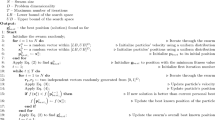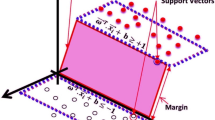Abstract
This paper proposes a novel method for controlling the convergence rate of a particle swarm optimization algorithm using fractional calculus (FC) concepts. The optimization is tested for several well-known functions and the relationship between the fractional order velocity and the convergence of the algorithm is observed. The FC demonstrates a potential for interpreting evolution of the algorithm and to control its convergence.
Similar content being viewed by others
References
Banks, A., Vincent, J., Anyakoha, C.: A review of particle swarm optimization. ii: Hybridisation, combinatorial, multicriteria and constrained optimization, and indicative applications. Nat. Comput. 7(1), 109–124 (2008)
Gement, A.: On fractional differentials. Proc. Philos. Mag. 25, 540–549 (1938)
Oustaloup, A.: La Commande CRONE: Commande Robuste d’Ordre Non Intier. Hermes, Paris (1991)
Méhauté, A.L.: Fractal Geometries: Theory and Applications. Penton Press, Cleveland (1991)
Podlubny, I.: Fractional Differential Equations. Academic Press, San Diego (1999)
Tenreiro Machado, J.A.: Analysis and design of fractional-order digital control systems. J. Syst. Anal.-Model. Simul. 27, 107–122 (1997)
Tenreiro Machado, J.A.: System modeling and control through fractional-order algorithms. FCAA—J. Fractional Calc. Appl. Anal. 4, 47–66 (2001)
Vinagre, B.M., Petras, I., Podlubny, I., Chen, Y.Q.: Using fractional order adjustment rules and fractional order reference models in model-reference adaptive control. Nonlinear Dyn. 1–4(29), 269–279 (2002)
Torvik, P.J., Bagley, R.L.: On the appearance of the fractional derivative in the behaviour of real materials. ASME J. Appl. Mech. 51, 294–298 (1984)
Westerlund, S.: Dead Matter Has Memory! Causal Consulting. Kalmar, Sweden (2002)
Herzallah, M.A.E., Baleanu, D.: Fractional-order Euler-Lagrange equations and formulation of Hamiltonian equations. Nonlinear Dyn. 58(1–2), 385–391 (2009)
Rabei, E.M., Altarazi, I.M.A., Muslih, S.I., Baleanu, D.: Fractional WKB approximation. Nonlinear Dyn. 57(1–2), 171–175 (2009)
Tarasov, V.E., Zaslavsky, G.M.: Fokker-Planck equation with fractional coordinate derivatives. Physica A, Stat. Mech. Appl. 387(26), 6505–6512 (2008)
Magin, R., Feng, X., Baleanu, D.: Solving the fractional order Bloch equation. Concepts Magn. Reson. 34A(1), 16–23 (2009)
Solteiro Pires, E.J., de Moura Oliveira, P.B., Tenreiro Machado, J.A., Jesus, I.S.: Fractional order dynamics in a particle swarm optimization algorithm. In: Seventh International Conference on Intelligent Systems Design and Applications, ISDA 2007, Washington, DC, USA, pp. 703–710. IEEE Computer Society, Los Alamitos (2007)
Kennedy, J., Eberhart, R.C.: Particle swarm optimization. In: Proceedings of the 1995 IEEE International Conference on Neural Networks, Perth, Australia, vol. 4, pp. 1942–1948. IEEE Service Center, Piscataway (1995)
Shi, Y., Eberhart, R.: A modified particle swarm optimizer. In: Evolutionary Computation Proceedings, 1998. IEEE World Congress on Computational Intelligence, The 1998 IEEE International Conference on, Anchorage, Alaska, pp. 69–73 (1998)
Løvbjerg, M., Rasmussen, T.K., Krink, T.: Hybrid particle swarm optimiser with breeding and subpopulations. In: Spector, L., Goodman, E.D., Wu, A., Langdon, W., Voigt, H.M., Gen, M., Sen, S., Dorigo, M., Pezeshk, S., Garzon, M.H., Burke, E. (eds.) Proceedings of the Genetic and Evolutionary Computation Conference (GECCO-2001), San Francisco, California, USA (7–11 July), pp. 469–476. Morgan Kaufmann, San Mateo (2001)
Solteiro Pires, E.J., Tenreiro Machado, J.A., de Moura Oliveira, P.B., Reis, C.: Fractional dynamics in particle swarm optimization. In: ISIC. IEEE International Conference on Systems, Man and Cybernetics, Montreal, Que. (7–10 Oct. 2007), pp. 1958–1962
Reis, C., Machado, J., Galhano, A., Cunha, J.: Circuit synthesis using particle swarm optimization. In: IEEE International Conference on Computational Cybernetics (ICCC 2006) (Aug. 2006), pp. 1–6
Eberhart, R., Simpson, P., Dobbins, R.: Computational Intelligence PC Tools. Academic Press, San Diego (1996)
den Bergh, F.V., Engelbrecht, A.P.: A study of particle swarm optimization particle trajectories. Inf. Sci. 176(8), 937–971 (2006)
Eberhart, R., Shi, Y.: Comparing inertia weights and constriction factors in particle swarm optimization. In: Proceedings of the 2000 Congress on Evolutionary Computation, Washington, DC, vol. 1, pp. 84–88 (2000)
Clerc, M., Kennedy, J.: The particle swarm—explosion, stability, and convergence in a multidimensional complex space. IEEE Trans. Evol. Comput. 6(1), 58–73 (2002)
Author information
Authors and Affiliations
Corresponding author
Rights and permissions
About this article
Cite this article
Solteiro Pires, E.J., Tenreiro Machado, J.A., de Moura Oliveira, P.B. et al. Particle swarm optimization with fractional-order velocity. Nonlinear Dyn 61, 295–301 (2010). https://doi.org/10.1007/s11071-009-9649-y
Received:
Accepted:
Published:
Issue Date:
DOI: https://doi.org/10.1007/s11071-009-9649-y




